We do not apologize for the things you will see here :)
Don't wanna be here? Send us removal request.
Text
Meet Xeni Ibañez aka Shadow Spider
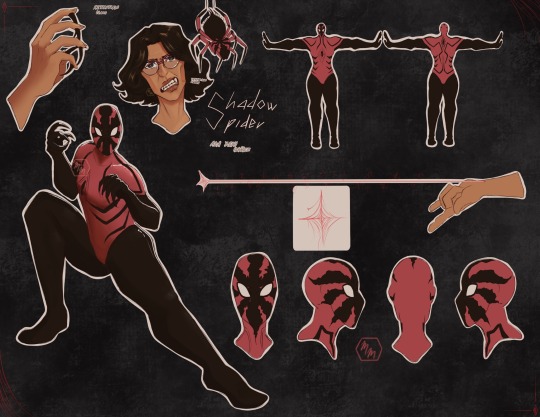
Meet my Spider-Sona, Xeni Ibañez aka Shadow Spider! She was mostly inspired by Miguel’s design, the fangs and claws. But she has more of a body horror twist to it given that she was bitten by a demonic version of a Colombian Black Tarantula. If curious I could probably answer questions with doodles of her 🥰
She is oh so completely self indulgent LOL was married to the Miguel O'Hara in her world but became widowed after he sacrificed his life for her and their child. Lives in a demon infested world, which is how the Demonic Tarantula bit her!
13 notes
·
View notes
Text
Marie as Lucifer
(You know that one painting of a crying lucifer? Yea that. LOL)
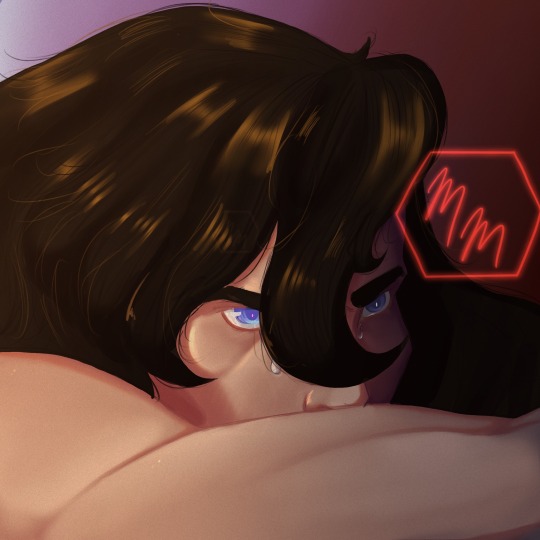
#i need to marry her#mcau#marie johnson#Marie#religious iconography#digital art#digital artist#art#artist#original character#mcu oc#marvel oc#melodicmel
1 note
·
View note
Text
Bates as Mima from Perfect Blue
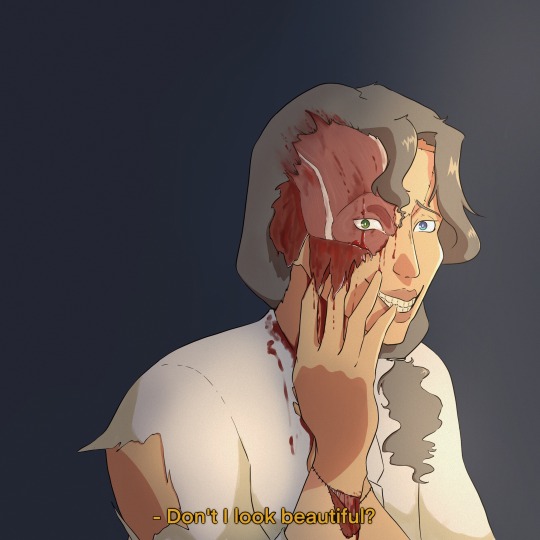
I recently watched Perfect Blue! And I'm horrible at executing fanart since I'm so hard on myself. So I do them as either my OCs or my friends! And here's Celeste's OC, Bates, as Mima from Perfect Blue!
#Perfect Blue#Perfect Blue Fanart#Fanart#mcau#MCU#MCU OC#Villain OC#artist on tumblr#artist#art#OC#Bates
1 note
·
View note
Text
Marie and Clara as Howl and Sophie
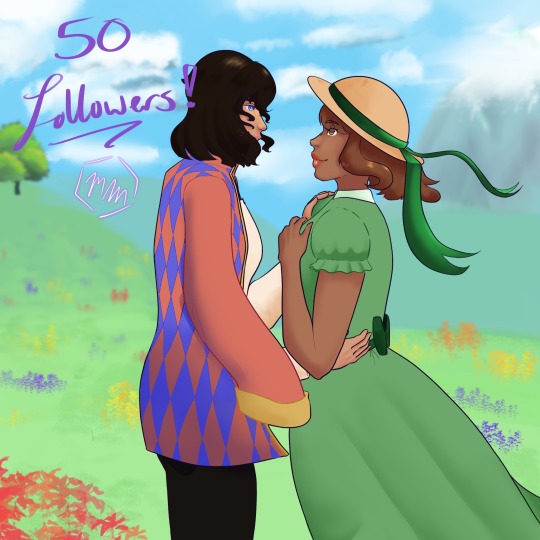
This for me hitting 50 followers on instagram yesterday! Have Clara and Marie cosplaying as Sophie and Howl! This is mainly Clara's idea
#howl pendragon#howl#sophie#sophie hatter#howl's moving castle#fanart#marie johnson#clara stark#MCAU#MCU OCs#Marvel OCs#Superhero OCs#Melodicmel
1 note
·
View note
Text
Hello Ira
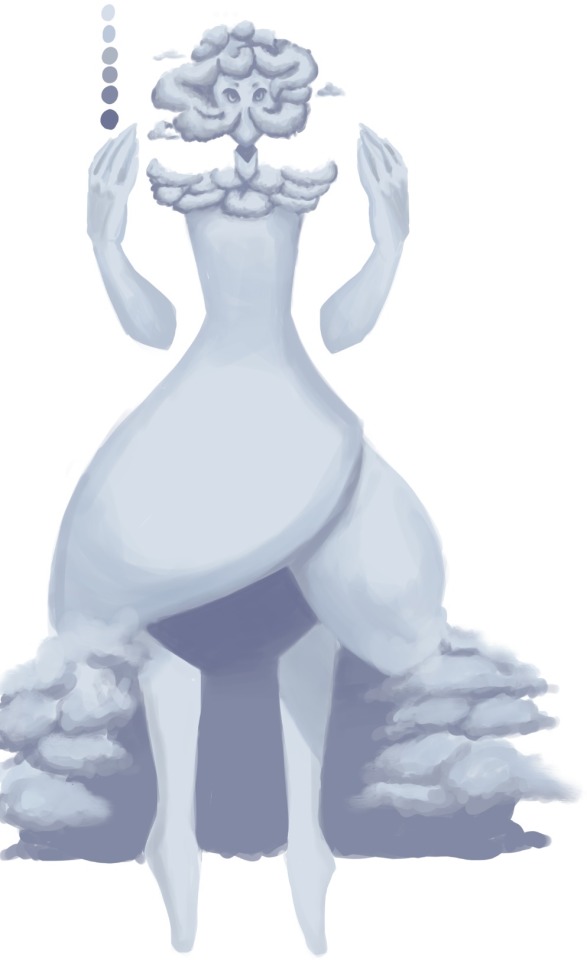
Primordial Ira got a new look :)
1 note
·
View note
Text
Crown Doodles
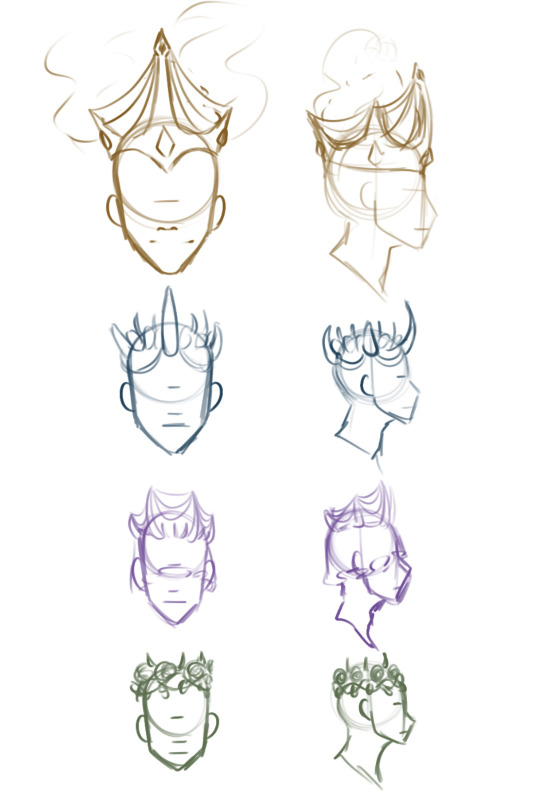
Crown Updates due to the Redoing of the atoll
1 note
·
View note
Text
Color Symbolism
❀
⤷ black
⟼ banishment, classy, cleansing, dramatic, elegance, exclusivity, formality, glamor, luxury, mystery, power, protection, retribution, sophistication, unconsciousness
⤷ blue
⟼ calm, clean, conservative, forgiveness, insight, inspiration, integrity, loyalty, patience, peace, reliability, security, serenity, stability, trust, wisdom
⤷ brown
⟼ approachability, comfortability, earth, friendliness, grounding, organic, permanence, practicality, security, strength, stability
⤷ gold
⟼ illumination, luxury, prestige, prosperity, radiant, rich, traditional, valuable, wealth, wisdom
⤷ green
⟼ abundance, balance, fertility, freshness, growth, harmony, healing, health, luck, maturity, nature, prosperity, restoration, wealth
⤷ grey
⟼ balance, calm, maturity, minimal, intelligence, neutral, reliability, sleekness, stability
⤷ orange
⟼ activity, creativity, confidence, encouragement, energetic, enthusiasm, excitement, friendliness, joy, optimism, success, youthfulness
⤷ pink
⟼ affection, compassion, femininity, friendship, happiness, harmony, love, optimism, playfulness, romance, self-love, softness, sweetness
⤷ purple
⟼ ambition, creativity, honor, intuition, luxury, majesty, mystical, nobility, royalty, sensitivity, spirituality, success, wisdom
⤷ red
⟼ action, ambition, attention, confidence, courage, danger, determination, desire, energetic, love, livelinesses, lust, passion, power, strength, urgency, vitality
⤷ silver
⟼ classy, glamor, grace, magical, modernity, style
⤷ turquoise
⟼ balance, emotion, healing, imagination, peace, protection, sophistication, spirituality, wisdom
⤷ white
⟼ beginnings, clean, divination, freshness, goodness, hope, imagination, innocence, minimal, modernity, peace, purity, simplicity, wholeness
⤷ yellow
⟼ cheer, energetic, enlightenment, friendliness, happiness, joy, intellect, learning, optimism, youthfulness
2K notes
·
View notes
Text
Juniper’s Massive World-Building Resource List
(Shamelessly cribbed from a dozen different sources)
1. The Checklists
These are the kinds of things that present you with a list of questions about your world, that you then answer as creatively as you want to. I find myself continually having to go back and add to them, because goodness sometimes I just want to write and not think about stuff that isn’t directly relevant to the plot…until it is. And then suddenly I have to think about the ramifications of that.
CRV’s Worldbuilding Checklists (originally from btot.de) - obviously more fantasy-focused Patricia Wrede’s Worldbuilding Lists - a good balance between fantasy and other genres
2. The Masterlist
This link has nearly everything you can think of. It’s not the be-all-end-all, because nothing is, but it’s damn good.
r/Worldbuilding’s Resources List
3. The Visuals
Yes, there’s the ever-present AI-generated images, things such as Artbreeder or Wombo Dream, but sometimes you need something more concrete. Like maps. Or people.
Also, pay artists to make beautiful things whenever you can. AI art is designed to remove the actual humanity from the creative process, and while it’s fine for face claims or inspiration, I would never ever use it as, say, my book cover.
Alsoalso, learn a little something about graphic design. Please. Color theory. Rule of thirds. I beg of you.
Things I have used for maps:
Inkarnate - Browser-based, but almost entirely fantasy-focused
Wonderdraft - Large-scale mapping for countries/continents/worlds
Dungeondraft - Smaller scale mapping that shines when doing smaller areas, especially interiors (both ‘drafts are from the same creator, and are desktop only) There is not, as of yet, a Towndraft, although the community is ravenous for it!
I highly recommend the art packs from Cartography Assets, although if you’re going to use them in a commercially released work, do be a good human and pay the artists for their work! If you want to do sci-fi or modern maps, this is where to get your assets!
Things I have used for people:
HeroForge - A 3D tabletop miniature creator with a vibrant modder community. The free version lets you create as many figures as you want, but their Pro deal lets you organize them into folders, which I absolutely love. It also lets you save specific colors/materials to use across multiple figures, which saves a lot of time when creating folks with a shared uniform. You can even import people/outfits/poses from other figures! I’m told that facial feature modification, clothing patterns, and kitbashing are coming this year! (I’m a little addicted, as you might’ve noticed.) Best on desktop, but you can get a quick “sketch” done on mobile.
Picrew - A truly massive collection of portrait creators. The Discord associated with it is really helpful, in that you can frequently get links to creators that meet your specific requirements, like ‘must have elf ears and POC skin tones’ or ‘must have heterochromia and vitiligo’. This site got me through the roughest parts of 2020. Great for mobile.
Meiker.io - Similar in scope to Picrew, Meiker has a few treasures, including a lot from the now mostly defunct DollDivine, which relied entirely on Flash. There are a few that I return to again and again, but not many. Best on desktop and very easy to create your own creators.
Neka.cc - A Chinese-based site with a lot of similarities to Picrew, although a lot less diversity, both in skin tones and bodies. Great for mobile.
Storior gets an honorable mention because it has a ton of potential, with a lot more options in some respects, but precious few in others. Best on desktop. Can you tell I really love these things?!
4. The Organizers
It helps to have somewhere to store all this information, right? Preferably in an easily accessed database? Perhaps with links or prompts?
These are the ones I’ve used:
World Anvil - Browser-based, incredibly detailed and complex, even for the free version. I found it to be too complicated to figure out, but maybe it’ll be your cuppa!
Campfire - Browser-based, mostly focused on writers, and has a suite of options that you can opt into or out of. This also wasn’t as useful to me, since there’s nowhere to put an outline!
Kanka.io - Browser-based, and just this perfect sweet spot between bare bones and overloaded. There are specific modules you can enable or disable, like in-universe calendars, dice rollers, character journals, etc. It’s my preferred option for organizing my world-building, outside of things like Google Docs.
I also understand a lot of writers like using Scrivener for their work, but as I have Linux, I don’t have any experience with it.
5. The Rest
So, a lot of world-building comes down to how well you know our world. I love world-building because it means I get to use all my education and interests together to create something that feels realistic to my readers and players. This is a time when ADHD is absolutely useful! Chase those squirrels! I can’t tell you how many times I’ve ended up reading an article on, say, rivers, only to end up with an idea for how leylines function in my world!
So here are my top 5 recommendations for figuring out how our world works:
Sociology! - If you want to know how different cultures interact, why certain customs come about, or just how a population reaches a decision, learn about sociology. It’s probably my favorite subject, and most useful to very culture-focused world-builders.
Geology! - If you want to know how your world fits together, what it’s made of, where things like mineral or gem deposits might be or how they might form… in addition to how rivers, lakes, and “strange” geographical features form, geology’s a great place to start.
History! - Okay, maybe this one is cheating, but I can’t tell you how many times I’ve read about something in history and thought “what if it went this way instead?” BAM, there’s a premise for you. (I have an entire novel idea built around that, told mostly through a writer interviewing a famous figure in this alt-history for their biography. After seeing the popularity of Dracula Daily, I almost want to release it like that…)
Ecology! - Oh man, if you want to figure out the botany and zoology of your world, ecology is a great place to start. It builds very nicely off of geology, and covers such a broad range of topics and how each of these pieces interact with one another - like how hydrology affects meteorology affects climate affects plant distribution affects animal distribution… which of course then affects culture!
I’m going to be sacrilegious in the eyes of some of my fellow world-builders here and NOT put linguistics - not because it’s not useful, just because it’s not a field I know much about. Instead, I’d suggest looking at world myths and religions. Yeah, it’s technically part of sociology, but if you’re developing a world from scratch, the creation stories that the sentient species tell themselves can inform a lot of their culture.
For instance, the world that Starcrossed, Amongst the Goblins & the Fishes, and The Silver Hand are all set in is an alternate Earth where magic never left the land. The creation myths in this world are much more centered around humanoids living in harmony with nature, rather than dominating it. In fact, some of the human societies have a specific taboo against desecrating the earth that is taken to such an extreme that other species, like elves and dwarves, occupy that niche instead, acting as stewards of the forest and mountain because they don’t have that same taboo. Part of these myths explain the existence of ley lines, and why they wither and die out (because of excessive logging, destructive farming/mining, or large-scale slaughter of creatures). Will this ever come up in Starcrossed? I highly doubt it. But it figures into the other two VERY prominently.
Phew! That was quite a tangent. Anyway - did I get any of your favorites? Do you have something you’d like to add? Should I make this all a separate page so it’s easy to access and update it regularly? Tell me things! Ask me things! I am an open book and love talking about world-building! Tell me where you’re stuck and maybe we can figure out a way forward together! (Also hmu on Discord, I am so mediocre at Tumblr.)
676 notes
·
View notes
Text
Naughty words in a godless world
Imagine you're writing a story that takes place in a world that has no God, or gods, or saints. What do you do with exclamations like "Oh gosh!" (derived from "Oh God") or "Jeez!" (derived from "Jesus!")? And - oh god - what do you do with curses and swear words? If your characters can't say "Oh my god", "hell no", or "damn" because there are no gods to damn anyone to hell... what are your options?
Here is a list for inspiration
In general, non-religious curse and swear words refer to local cultural taboos.
Many languages swear by referring to cleanliness: dirty, sweaty, sticky, smelly etc. This includes things you do on the toilet.
Some languages, like Dutch, use diseases as curses and insults. For example, someone nasty/bothersome might be called a "cancer sufferer" in Dutch. These swear words are combinations of (derivates of) typhus, cholera, and cancer.
Societal hierarchy and family trees, mainly the inferior positions like a bastard (seen as inferior in the family tree) or a derogatory word that refers to lower class people (seen as inferior in that society).
On the other hand, you could insult a highly valued member of the other person's family, like their mother, or of their society, like their Queen/Emperor.
Sexual taboos, often implying someone (or their mother) is more sexually active than society accepts of them.
Calling someone the word for someone's genitalia refers to the same taboo.
How do you apply this to your language?
You could use explicit/taboo words as ... :
... an intensifier: "It was a shit-hot day."
... a negative adjective: "This is a shitty job."
... an insulting noun: "This journey is shit."
Or try to be creative and combine different taboos for a multi-hit offense. My favorite one is the Spanish "I shit in your mother's milk", which combines insulting the other person's mother, the taboo of bodily functions, and the taboo of cleanliness.
During my research I came across this article, which contains a number of concrete examples from all over the world you can draw inspiration from.
And on a less offensive note, you could always make up your own equivalent of "Merlin's beard!", "Great Scott!", or "For Pete's sake!" (Pete, by the way, is a catholic reference: Pete is Saint Peter.)
I hope this was helpful. Don’t hesitate to ask me any questions, and happy writing!
Follow me for more writing advice, or check out my other writing tips here. New topics to write advice about are also always appreciated.
Tag list below the cut. If you like to be added to or removed from the list, let me know.
And if you come up with creative curses, feel free to add them in the comments :)
@therska @writingwordsaddrawingpictures @the-words-we-never-said @writingwhithotchocolate @i-rove-rock-n-roll @maskedlady @no-time-like-write-now @timefire25 @black-lakritz-dragon @nzmayart @fandomrandomness-stuff @dangertoozmanykids101 @anaestheticdisaster @storytellingofravens @purpleshadows1989 @mathematicpony @i-don-t-know-words @notquitenovelist @coffeescribles @reffaces @livingthelovelylife @katsglabella @lokitty-is-my-spirit-animal @thefallenbibliophilequote @watchmewritedumb @sting-the-scribe @kais-writing-shit @dameschnee123 @curiosityonmars @oodlittlething @nonbinarychaoticstupid
8K notes
·
View notes
Text
World Building
Types of Government
♛
⤷ anarchy
➝ society without enforced government
⤷ aristocracy
➝ small, elite ruling class holds power over lower socioeconomic strata ; members chosen based on wealth
⤷ autocracy
➝ controlled by one singular person of power without restraints
⤷ communism
➝ state owns and operates industry on behalf of the people ; citizens are apart of a classless society that distributes goods & services as needed
⤷ democracy
➝ power held by the people through voting in order to ensure fair representation and prevention of abuse of power
⤷ dictatorship
➝ power held by one person or a group of people who control the masses
⤷ fascism
➝ control of the people by promoting ancestral/cultural values & eradicating foreign influences
⤷ federalism
➝ union of smaller states which are self-governed yet united under a central government
⤷ junta
➝ militaristic rule after taking over by force
⤷ monarchy
➝ authority is vested in a single figure for life and passed down hereditarily ; level of power may vary from absolution to nonexistent
➝ constitutional monarchy: limited power as outlined in a constitution // absolute monarchy: unlimited power
⤷ oligarchy
➝ authoritative power rests with a small faction of people or families who are deemed worthy due to wealth, education, and/or family history
⤷ plutocracy
➝ ruled by the wealthy
⤷ republic
➝ democratic model in which the people elect representatives
⤷ socialism
➝ collective and cooperative ownership of production, opposed to private
⤷ stratocracy
➝ ruled by the military following wars and expansion
⤷ technocracy
➝ scientists are decision makers ; rulers are chosen based on experience/knowledge/skill
⤷ theocracy
➝ power rests with religious figures ; scriptural laws and legal codes are coincided
⤷ totalitarian
➝ total control by government including the prohibition of opposition & extreme regulation of public/private life
⤷ tyranny
➝ absolute control by ruler with an oppressive power
3K notes
·
View notes
Text
Conlanging for cheaters
quick tips for creating fantasy language(s) that look believable if you squint
Pick a few rules about what letter/sound combinations can and cannot exist (or are common/uncommon). For example, in English, "sp" or "st" can begin a word, but in Spanish they can't. The "ng" sound (or the voiced velar nasal if you want to get technical), can't appear at the beginning of a syllable in English, but it can in at least of third of languages around the world. English allows for consonant clusters (more than one consonant together without a vowel), but some languages, such as Hawaiian, don't. Picking a few distinctive rules that are different from English or the language you are writing in, and sticking to them, will yield a lot better results than just keysmashing.
Assign meaning to a few suffixes, prefixes, or roots. A simple and useful example of this is making up a particle that means -land or -city or -town, and tacking it onto your appropriate place names. You could also have a particle with a similar meaning to the "er/or one we have in English, such as in "baker," "singer," or "operator," and then incorporate it in your fantasy titles or professions. It's like an Easter egg for careful readers to figure out, and it will make your language/world feel more cohesive.
Focus on places and names. You usually don't need to write full sentences/paragraphs in your conlang. What you might want to do with it is name things. The flavor of your language will seep in from the background, with the added benefit of giving readers some hints on background lore. For example, you could have a conlang that corresponds to a certain group of people, and a character with a corresponding name could then be coded as being from that group without having to specify. A human-inhabited city with an elven-sounding name might imply that it was previously inhabited by elves.
You don't have to know what everything means. Unless you are Linguistics Georg R. R. Tolkien, you probably don't want to (and shouldn't!) actually make up a whole language. So stick some letters together (following your linguistic rules, of course) and save fretting over grammar and definitions for the important stuff.
(Bonus) This isn't technically conlanging, but it can be fun to make up an idiom or two for your fantasy culture (just in English or whatevs) and sprinkle that in a few times. The right made-up idiom can allude to much larger cultural elements without you having to actually explain it.
Congrats! You now have a conlang you can dust over your wip like an appropriate amount of glitter. Conlangs can be intimidating, just because there's so much you can do, but that doesn't mean you have to do it all. So yeah anyway here's what I would recommend; hope y'all have fun :D
8K notes
·
View notes
Text
Meet Marie Johnson
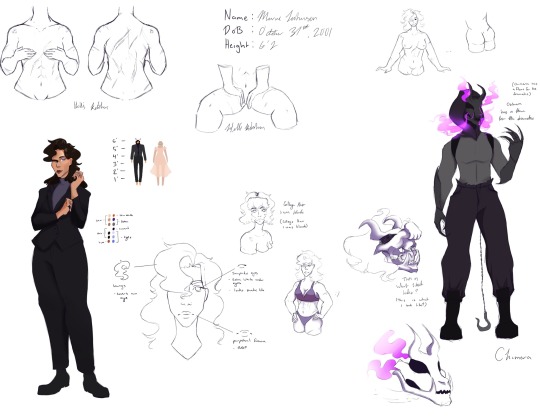
MCAU Hero (Mel's Hero)
Update: She will get a cybernetic eye LOL but that idea came after I finished doing the reference sheet LOL
2 notes
·
View notes
Text
worldbuilding holidays; possible traditions for holidays based on historical events:
commemorating victims of the historical event
parades
mass lighting candles
displaying art related to the event
cooking traditional dishes
organizing discussions and lectures to educate the public
planting commemorative trees
family trips to museums
discussions with people who lived through the event
reenacting the event
family reunions
wearing awareness accessories (ribbons, etc.)
political figures giving commemorative speeches
fundraisers for victims of the event
workshops to educate children in schools
building monuments/statues
feel free to add more!
1K notes
·
View notes
Text
Happy New Year!
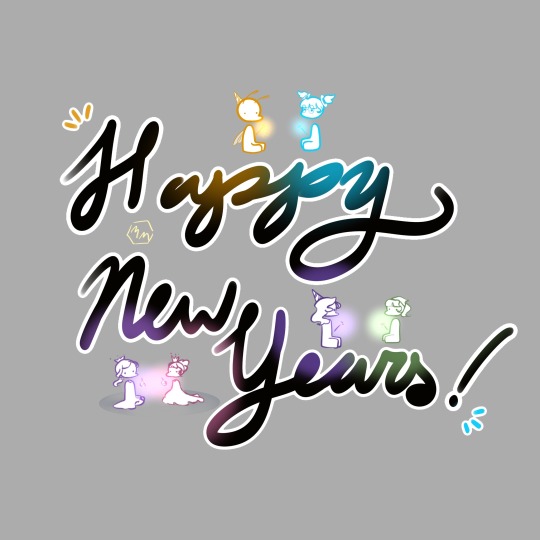
Here's to a Creative Future!
1 note
·
View note
Text
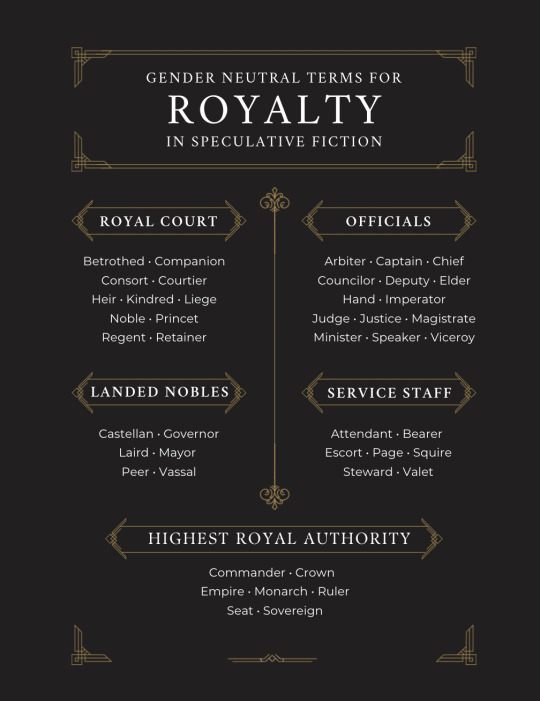
I was inspired by @jezifster's recent question about non-gendered royal titles, and I put together this graphic to serve as a jumping off point for people writing monarchies in SFF !
Obviously this non-exhaustive list contains mainly western titles, all in English. Feel free add any on additional gender neutral terminologies that you can think of, including those from different languages and cultures!
A small addition: I'm not a linguist or historian and put this list together based on some quick googling! While you're free to flex the usage and meanings of these words however you choose, researching the real-world context of each term before using them in your own writing is a best practice.
9K notes
·
View notes
Text
World Building 101
World building! How many other hobbies or careers involve creating an entire world all your own? Not many.
There’s nothing quite like setting out to create your fictional world. Drawing maps, deciding which civilizations live where, throwing in crazy kinds of solar systems and vegetation if you’re really going all out… it can be a ton of fun.
However, one of the writer’s most exciting tasks is also one of their most intimidating.
On one hand: you get to build your own world. On the other hand… you have to build your own whole entire WORLD?! Where do you even start??
Well, you can start right here. Today I’m going to walk you through some basic pointers to get your world up and running.
World Building and World Building
Right off the bat, you should be aware that there are two kinds of world building. There’s the large-scale fantasy world building which I will be talking about today, and there is also world building that goes into other story genres.
Every writer is going to do some level of world-building, whether you’re painting a verbal picture of the lake your character goes to to get some peace of mind, pulling a reader into an important event and making them feel like they’re actually attending, or creating a whole new planet for your space pirate to fly to.
The Top 6
When you have a massive task ahead of you it’s always best to start by breaking it down. So, let’s take a look at the top 6 features you’re going to be focusing on when building your world.
WHO
Ask yourself: who lives in your world?Most likely there is a variety of species and races. Or, you could decide on a world where every creature is exactly alike — it is of course, your world.
Do the creatures of your planet have different cultures or are these homogeneous?
It will be easiest to start off with your main characters and work out from there. What is their species and race, and what does their culture look like?
For each species in your world, jot down the following:
Species name
Race names
Physical description
Language
Cultural notes
Special abilities
WHAT
Ask yourself: what social structures exist in your society? Again, start with your main characters and work out from there. For each species within your world, you’re going to need to determine how they manage their society.
What beliefs do they have? Are they religious, or more philosophical? Is there a divide between the two? What do their political structures look like? How strict are their laws?
You’ll want to consider trade and economy as well. Do they have a money system? A barter system?
You may not need to go too in depth with every single species in your world, but you’ll want a basic note or two about each in case it comes up in your writing.
For each species in your world, decide at least one point about each of the following:
Religion
Philosophies
Politics and laws
Economy
WHERE
Ask yourself: where does your species exist?Finally, we get to the physical world of your world building. What is the geography like? The biomes? Is your world bountiful with resources or is it a dying planet with species’ in desperate search of new sustenance?
For some writers, they will take years fleshing out the ‘where’ of their world, including the cosmos surrounding it. For others, a map with the basic locations of the story will suffice. It is up to you how in-depth you would like to go.
At the very least, you should outline one or two notes about each of the following:
Solar system (does your world exist near ours or is it completely fabricated?)
Geography (this one can be split per species — forest elves live in the woods, nymphs live near the sea, etc.)
Biomes (split by species region)
Resources (split by species region)
WHEN
Ask yourself: when do the events of your story occur?The story you are telling may be the main focus of your book, but what happened to lead up to it? What has your main character’s species and world been through that is causing the story to occur? Even if the events of the world do not impact your story much, they will have had at least some level of ripple effect that reflects on your characters’ day-to-day. Was this civilization a warring one and the story takes place in a broken society? Or, has their society reached its peak of enterprise?
For each region in your world, establish the following:
Founding events
Defining events
Recent events
(if relevant) Future events
WHY
Ask yourself: why do the species in your world behave as they do?The why of your story will tie in with many of the previous points you’ve outlined, but it gets more to the point in a way that can directly apply to your story and characters. Why are things happening as they are today? What evolution did this society go through? Do they share common goals now or are your characters going against the grain of their people? What conflicts exist in this world, and is your main character involved in those conflicts or attempting to avoid involvement?
A few pertinent notes to take per species would be:
Social evolution
Societal goals
Societal conflicts
HOW
Ask yourself: how do the species in your world solve problems? In the category of ‘who’, you will have outlined your main characters’ abilities. These could be magical or technological or maybe they are super strong, or super smart. Now, you can get deeper into the magical or technological systems of your world. Start with your main characters and work outwards. Is everyone magical here? Do different species and races have different abilities? Is there a human or human-related race, and at what point are they at with their technology?
Figure out the following (for each species and race if applicable):
Magic abilities
Technological advancements
Scientific knowledge
Militaristic power
The World is yours: Command it
An author with a strong command of the world they are writing within will have at their fingertips an endless landscape of possibility. Look to authors such as J.R.R. Tokien or George R.R. Martin — it’s no wonder their works are so successful. They perfectly encapsulate what fantasy readers are looking for in a novel: escapism. The worlds don’t need to be pretty, they need to be fully formed; realistic in their mysticism.
World-building can seem like a lot of work, and it is. But do it bit by bit, and try to keep it fun. Don’t sit down in one day expecting to create your whole world. It’ll take time. But that time spent will be well worth it in the end!
639 notes
·
View notes